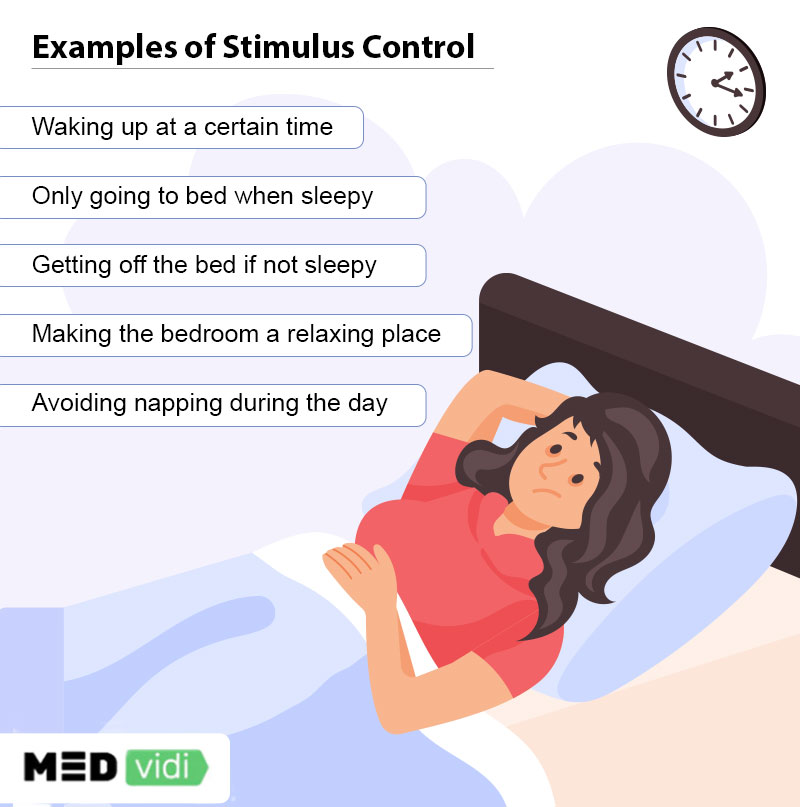Without a doubt, dealing with insomnia can be challenging. And even though there are various helpful medications, some people prefer not to take sleeping pills or cannot take them for other reasons. So, what’s the solution?
The most common solution, in this case, is turning to cognitive-behavioral therapy for insomnia,
Do you have trouble falling asleep? See a doctor to get professional help and lifestyle recommendations.
What is Stimulus Control in General
Specific conditions or cues (stimuli) influence a person’s habits, which can lead to certain patterns of behavior. The instructions are set on the psychological principle of conditioning which leads to a specific pattern of behavior when exposed to the stimulus and a different behavior pattern when the stimulus is absent.
One of the simplest
How Stimulus Control Helps with Insomnia
These associations of sleep with alertness, anxiety, and uncertainty develop through reinforcement because a particular stimulus, which in this case is being awake in bed, is triggered by insomnia.
So, when it comes to trouble sleeping, the term
Different treatment options can help overcome insomnia. Consult a doctor at MEDvidi to know what will work best for you.
Stimulus Control Therapy for Insomnia
1. Waking up at a specific time
The body uses cues like darkness and daylight to control when to sleep and wake up. Most people with insomnia usually continue sleeping later in the morning to compensate for sleeping late. Unfortunately, extending the sleeping hours throws off one’s circadian rhythm. Waking up at a specific time each morning helps strengthen the body’s sleep cues.
So, setting the alarm and waking up simultaneously every day helps maintain a person’s circadian rhythm that controls their body cues. They can choose a realistic waking up time to help with consistency.
2. Only going to bed when sleepy
It’s logical for a person to go to bed based on the amount of sleep they think they need before they wake up in the morning. However, this is not the case for those struggling with insomnia because it only adds to the pressure. After all, sleep comes when one is relaxed and content. Instead, they should listen to their body and only go to bed when they feel sleepy and struggling to stay awake.
3. Getting off the bed when not willing to sleep
This stimulus control technique is related to the previous one. When someone notices that they are still awake fifteen minutes after getting in bed, they should get up and go to a different room. It can be frustrating for someone to lie on their bed for a long time without an ounce of sleep. Though it’s not easy to get out of a comfortable bed, it will help to get used to the fact that the bed is a place where your mind and body are ready to rest.
When one goes to a different room, one should engage in relaxing activities such as reading a book or listening to soothing music at a low volume. They can then go back to bed when they start drifting off to sleep and repeat the process as many times as needed.
Sometimes, lifestyle changes are not enough to help manage insomnia. Consult a doctor to know if medication for insomnia or psychotherapy are required.

4. Using the bedroom only to sleep
Maintaining the relationship between sleep and the bedroom is important by using it only for sleep and relaxation. One should avoid stimulating activities that may keep them awake, like browsing through their phone, watching TV, playing games, eating, or having stressful conversations.
In addition, sleeping anywhere else instead of the bed weakens the relationship between sleep and the bedroom. So, when someone starts dozing off when bedtime approaches, it’s best to head to their bed.
5. Avoiding napping during the day
Short naps of 15 to 30 minutes during the day can be an excellent method to refresh and boost energy and concentration. However, it is only true for those having good sleep at night. One should avoid napping during the day when they are following the stimulus control therapy to help them easily fall asleep during bedtime.
Conclusion
Stimulus control helps train a person’s body and mind that going to bed means sleeping. Controlling stimulus helps a person consistently get more hours of restful sleep. If you have insomnia and want to know if stimulus control is the best treatment option for you, reach out to MEDvidi doctors and get personalized support.












